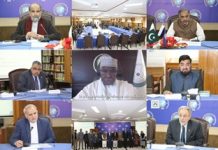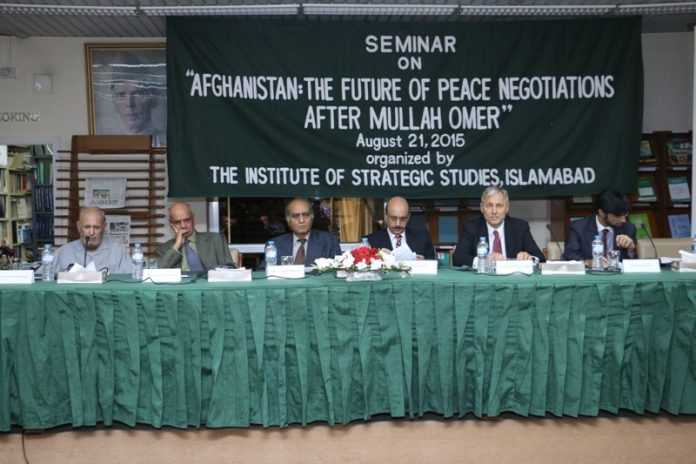The Institute of Strategic Studies Islamabad (ISSI) arranged a Seminar to highlight challenges arising after the death of Mullah Omer, and how they will impact the ongoing peace process in Afghanistan. The Keynote Speaker at the Seminar was His Excellency Ambassador Franz-Michael Mellbin, the EU Special Representative for Afghanistan.Other guest speakers at the talk included Ambassador (Retd) Rustum Shah Mohmand, former Ambassador to Afghanistan, Lt. General (Retd) Asad Durrani, Dr Moeed Yusuf, Director, South Asia Programmes at the United States Institute of Peace; and Dr Sarfraz Khan, Director, Area Study Centre, University of Peshawar.
The session was opened by the Director General ISSI, Ambassador Masood Khan, who highlighted the importance of peace in Afghanistan for Pakistan and the region, especially after the drawdown of NATO forces in Afghanistan. He pointed out the important role played by Pakistan on the insistence of international community for bringing all the stakeholders to the table to resume the dialogue process. Ambassador Khan also pointed out that Pakistan had no vested interest except peace in Afghanistan, and remained committed on resuming the dialogue process without delay after the death of Mullah Omer. H.E. Ambassador Mellbin talked about the future situation of peace talks in Afghanistan and the arising uncertainties after the death of Mullah Omer. He believed that Mullah Mansoor, the new appointed leader of the Taliban was interested in the peace talks, but his ascension to the leadership role was being questioned by some quarters in the Taliban camp. This had led to increase in violence in the country. He was not sure about the impact of the talks and ensuing results that will come out of them. He applauded the efforts of Afghan President Mr. Ashraf Ghani and also the Pakistan Government in the role they have played in the peace talks with the Taliban.
Dr Moeed Yusuf in his talk highlighted the fact that there was no Plan B, and talks were the only way forward. He said that the death of Mullah Omer had complicated the situation as the Taliban have been divided into several splinter groups after the news of his death broke out. He urged the Pakistani government to play its role in this process which will go on for months if not years, to find a resolution.
Dr Sarfraz Khan highlighted the positive change in relations between Afghanistan and Pakistan after President Ghani had come into power. He said that there was a huge opportunity for both countries to get rid of home grown and other external Taliban with the support being provided by all the major powers.
Ambassador Rustam highlighted the importance of Mullah Omer for the Taliban and how his death had created a void. He further stated that Pakistan should not support one Taliban group against the other and should play a positive role. He further highlighted the emerging IS threat in the region and what negative impact it could have for all countries in the region.
General Durrani also touched upon the rising threat of IS in the region, and stressed on the need for creating a stable environment which would enable all stakeholders including the Taliban to play their part in the ongoing peace talks. He believed that the talks were a step in the right direction and hoped for a peaceful Afghanistan to emerge after all the turmoil of past 3 decades.
During the Q&A session all the panellists answered in a very frank and open manner. It was stated that Pakistan should not allow its land to be used for terrorist activities and a stable and peaceful Afghanistan was in the best interest of Pakistan. Therefore, all efforts should be made to ensure that the peace talks continue and emerge with a positive outcome.
A. Salik/A. Safee/21082015












